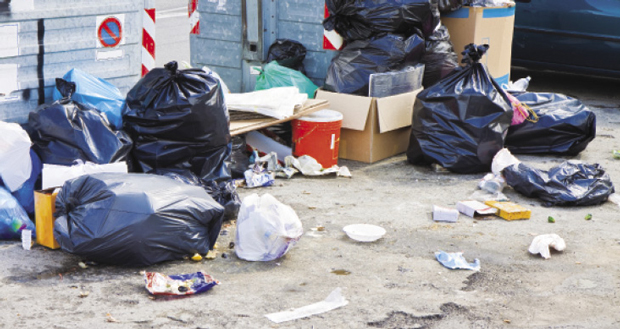 Littering and fly-tipping has escalated during lockdown with many FMs reporting that they’re having to deal with illegal disposal of waste around their buildings. Aaron Georgiou, CEO and Founder of Litta offers advice on tackling the problem
Littering and fly-tipping has escalated during lockdown with many FMs reporting that they’re having to deal with illegal disposal of waste around their buildings. Aaron Georgiou, CEO and Founder of Litta offers advice on tackling the problem
Fly-tipping has long been a serious issue in the UK. And sadly, it is spiralling out of control. The number of illegal waste dumps reported across the UK is rising at an alarming rate, threatening the health, safety and beauty of many areas. Local authorities are in a constant battle to reduce the total tonnage of commercial and residential waste being left on our streets, yet even with increased powers and tougher penalties in place, they are struggling to bring the problem under control.
Let’s look at some numbers to put things into perspective. According to the most recent government figures, local authorities in England dealt with over one million fly-tipping incidents in the 12 months leading up to April 2019 –representing an eight per cent increase in the number of cases reported in the preceding year. Clearing these sites cost local authorities £12.2 million.
This is a worrying observation, particularly at a time when many local authorities are seeing budgets shrink and fly-tipping spike. Indeed, the COVID-19 pandemic has only made the situation worse; since the introduction of lockdown measures in mid-March, the Countryside Alliance has reported as much as a 300 per cent increase in the number of fly-tipping cases in some regions.
There are plenty of contributing factors to explain this dramatic increase. The first has to do with the limited availability of rubbish collection services at the height of the pandemic: recycling plants and tips were temporarily closed, and local councils reduced their services outside of standard rubbish collection. The second factor has to do with an increase in level of household waste needed to be disposed of – with people isolating at home, there has been an increase in DIY renovation projects as well as the clearing out of unwanted household items.
The fallout from the pandemic has shown that current policies and strategies are simply not working. If not addressed soon, we face the prospect of more rubbish dumps on our highways, parklands, commercial spaces and residential streets. This is all the more pressing as businesses prepare to return back to their workspace after months in lockdown.
COMMERCIAL WASTE SET TO RISE
Over the past three months, Litta has seen a rise in the amount of fly-tipping taking place on commercial sites and industrial parks. These sites are usually outside of the public eye and make for an ideal dumping ground for illegal tippers given that they have been deserted during lockdown.
Coupled with this, many businesses will soon be renovating their offices – with social distancing measures still in place, we can expect workspace layouts to change and furniture to be removed in order to create more space between employees. This will mean more waste, which could result in yet more fly-tipping.
So, as businesses return to their offices and factories, we should expect a rise in the number of companies reporting fly-tipping on or near their commercial sites. This is part of the reason why Litta recently launched a fly-tipping alert system to ensure that local businesses and residents can quickly notify councils of illegal waste dumps.
Waste disposal centres are reopening, though they are not operating at 100 per cent capacity. They will also need to clear through a backlog of waste, meaning longer processing times and delays. This is not ideal given the sheer volume of waste we can expect will need to be cleared in the coming months. It also could result in more people engaging with illegal waste disposal companies, which are responsible for illegal fly-tipping in the first place.
A recent site we helped with in Uxbridge, London, puts things into perspective. At the beginning of June we helped clear a 75-tonne fly tip on a commercial estate. The waste had been there for over a week and was the heaviest volume of waste we have cleared in our three-year history. Unfortunately, sites like these could become more commonplace.
THE ANSWER LIES IN TECH
To ensure the UK can effectively stamp out fly-tipping in the UK, a change of approach is urgently needed. Councils are not in a position to solve the issue independently. Instead, they need to be striking new relationships with local businesses to ensure they are able to not only monitor but also prevent illegal rubbish dumps.
Part of the solution lies in technology. At the moment, surveillance cameras are being used to watch popular fly-tipping sites. This has had some impact, but there are plenty of other ways tech can help. Litta’s fly-tipping alert system is one such example; it uses GPS to identify and track fly-tipping sites, automatically passing this information to the council.
The application of technology in the waste removal space is not limited to the identification of fly-tipping sites. Apps can also be used to track the lawful removal and disposal of waste by providing driver tracking numbers and a full audit trail. This is extremely important for businesses, particularly as the Environment Protection Act states that any organisation who uses a waste collection provider must ensure they are fully licensed. If this is not the case and the rubbish is unlawfully disposed of, the organisation will be held accountable.
These next few months will ultimately determine whether the UK will be able to put an end to fly-tipping. This requires creative thinking, and a willingness to embrace technology before it is too late. Thankfully, there are already solutions available – the challenge is making sure businesses, councils and consumers are ultimately aware of them.





